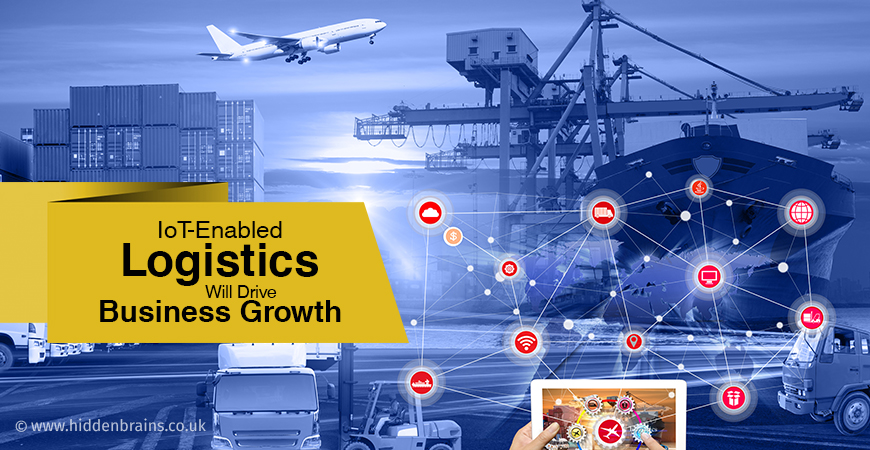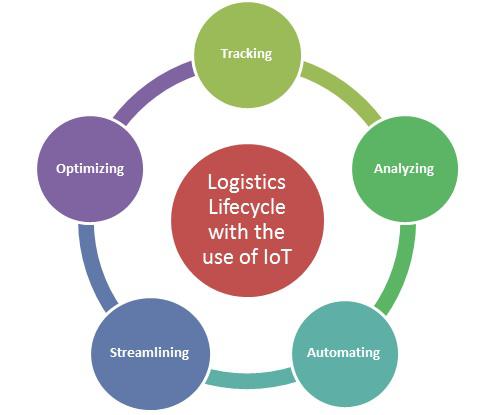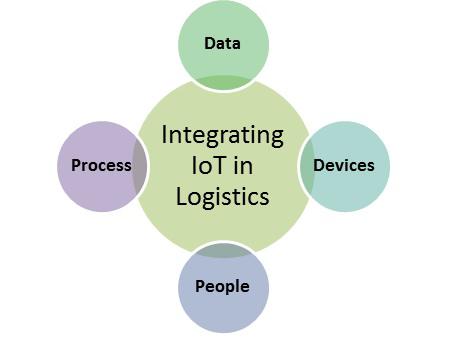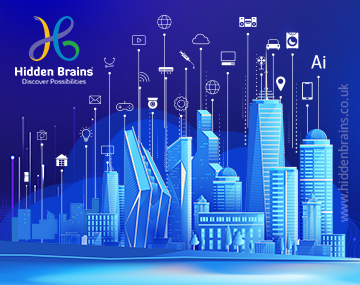
Getting used to a world where we live and breathe the internet, the term or experience of ‘connectivity’ is usually taken for granted. We are completely dependent on these digital devices and extremely addicted to this connected world. The accelerating influence of the IoT in logistics is seen in the way we communicate with each other and entertain ourselves.
Internet of Things (IoT) has always been the much-desired ecosystem where several physical devices (smart gadgets) are wirelessly connected to each other in the same network. This technology has influenced our way of living drastically by integrating different technologies such as Bluetooth, RFID, Wi-Fi and Zigbee over wireless networks.
In this blog, we shall discuss the prominent role of IoT in the Logistics and Transportation Industry.
As stated in a new market report on the IoT in the logistics market published by Transparency Market Research, the global Internet of Things in the logistics market is projected to reach US$ 63,728.6 Mn by 2026 driven by an exponential rise in IoT applications in logistics.
Call us today for a FREE no-obligation quote.
Internet of Things in Logistics and Its Impact

Logistics operators, business as well as end consumers are seen the bright side of IoT when implemented to complement Logistics operations. Experts identify areas in Logistics operations that can be automated with the Internet of Things. Scrutinizing the processes involved in the entire logistics value chain, experts find a way out to integrate warehouse operations, Warehouse Automation, freight transportation, and final delivery with the help of an integrated IoT system.
Some may argue that launching such IoT systems is expensive. However, when compared to the benefits of this system with respect to the safety and security of workers, their overall operational efficiency, and improved customer experience, the cost at which it comes seems to be a reasonable deal.
The following pointers will give you a clear picture of the impact of IoT on Logistics operations management:
- Get real-time updates on each operation of logistics
- Check the status of assets or parcel and get accurate information about the same
- Monitor and analyze how the assets are performing to improve their overall speed and cut the time to delivery
- Automation of several operations by programming devices to work as per a set of predefined rules in order to reduce human intervention, eliminate human error, improve quality, and lower costs.
Such real-time tracking of parcels and assets helps in optimizing the overall logistics operations lifecycle.
What Drives the Need for IoT in Logistics?

Cloud computing and Big Data have made it possible to manage large data sets and analyze it using appropriate tools. While such technologies are now easily available, the logistics industry aims to make the most of IoT to gather large amounts of data that could help them in refining operations for maximum benefit.
Some obvious reasons that dictate the need for IoT in the logistics industry are as stated below:
- Customers expect complete transparency and integrity control throughout supply chain management projects.
- End consumers demand to track the shipment of their product, which is quite easy with an integrated IoT system in place.
- Reduce manpower for customer support related to tracking & shipment queries by providing end-users with unique tracking IDs to check the real-time status of the shipment.
Call us today for the best IoT Solutions For Your Logistics Business.
Talking about the practical implementation of IoT)in Logistics, here is how the technology can help in maximizing the overall performance:
Operational Efficiency
Optimum utilization of assets that are connected within an IoT network results in higher operational efficiency.
- Management of Traffic and Fleet: Vehicles are a valuable asset of a logistic firm and play a significant role when it comes to traffic and fleet management. Transportation and automotive industries are investing heavily in connected vehicles so that the entire delivery system can be paced up with IoT.
- Monitoring of Energy & Resources: IoT capabilities are used in effective monitoring of electricity, water, and natural gas consumption. It is possible to implement a smart grid with an integrated IoT system that prevents disasters and also reduces waste.
Tracking Equipment
While Logistics operation requires the utilization of quite a lot of equipment, it becomes mandatory to keep track and check the status of each of them.
- Real-Time Status of Equipment: Use audio and visual sensors on tracks to monitor vehicles and get real-time updates on them. These sensors send notifications to the IoT system on when and where the vehicle reached from time-to-time. This reduces the risks of delivery failure due to derailment delay or equipment failure.
Smart Inventory Management
- IoT in Logistics helps transportation to streamline the process in an effective manner and improve the performance of the warehouses.
- However, the ‘Internet of Things’ solutions help companies ranging from startups to large enterprises to avoid a lack of future products and failures.
- It also plays a huge role to deliver the products on time as the whole process will be streamlined, so there will be no chances to delay the delivery to customers.
- Smart sensors can easily track inventory items and monitor their status on a daily basis.
- Along with this, on the requirement, IoT-based equipment and apps can automatically give orders. Smart solutions lead to not overstock the products and save space in the warehouses.
Fleet Management
- Only the inventory management process is not sufficient, in transportation and logistics, Fleet management is the major challenge to maintain infrastructure.
- With advanced IoT sensors, enterprises can improve the overall performance by maintaining the schedule of employees, daily monitorization of vehicles, and their usage with real-time information.
- In the logistics and transportation industry, it is essential to get connected and have real-time information on field and vehicle information.
- Innovative Internet of Things smart solutions helps to enhance communication among enterprises and carters.
- With the help of IoT in Logistics, Its connectivity offers a smart location management system that helps to track vehicles, increase response time to unexpected scenarios. Along with this, it also helps in managing operations such as vehicles, drivers, and staff on the field.
- IoT apps and devices help to eliminate hard and soft copies from the process, with biometric easily the operations can be streamlined and it will also help to increase productivity with real and accurate data.
Fleet management plays a crucial role in managing your business venture and IoT has played a revolutionizing role in the same. Here are some of the ways in which IoT plays a leading role in fleet management. The following are the benefits of IoT in the transportation and logistics industry pertaining to fleet management and some of them are as follows-
- IoT helps you comply with the existing environmental and safety regulations in operation within your country and attain a more sustainable approach in running and managing your fleet.
- Fleet management can be effective in monitoring drivers’ behavior that might be helpful in enhancing the safety of your fleet. Several tools and technology help in restricting the speed of your vehicles and prevent accidents. Fleet management also comprises software that ensures the drivers are not drowsy or drunk while they are behind the steering wheel. Thus, IoT has helped in improving your vehicle and drivers’ safety while they are on duty.
- IoT systems help you arrange a specific schedule for inspecting and repairing your vehicles which also reduces the chances of recurring activities. Thus, you can save significant resources by avoiding conducting the same activity of specific vehicles regularly and leaving out the rest. Thus IoT helps in monitoring your vehicle’s condition and repairing it whenever required.
- Customer satisfaction is the key to your business’s success and IoT helps you enhance the same. You can now ensure timely deliveries through a more comprehensive and efficient fleet management system through IoT.
- IoT helps you adopt a more cost-effective approach for your business. IoT tools and systems help you reduce the fleet’s fuel consumption by fetching the shortest route to different destinations. Thus, it helps you reduce your costs on fuel and also increase the time-efficiency of your fleet.
Daily Monitoring
- The Internet of Things helps you to monitor daily activities, so it will never all you to face future challenges.
- It monitors inventories, productivity, and human performances, on a daily basis processing to get productive and efficient results without any errors.
- IoT plays a crucial role in bringing about a continuous improvement in your organization by monitoring the performance of your employees. It helps in maintaining a detailed account of employee performance that in turn helps the management to assess their strengths and weaknesses and take necessary actions.
- The progress of your organization and the latest trends can be traced through IoT tools. While on the one hand IoT helps you assess your organizational performance, it also helps in drawing a fruitful comparison between your current and past achievements.
- IoT ensures all the necessary data are stored systematically so that they can be used whenever required. The systematic integration and storage of data has helped business organizations track their performance and avoid clumping of unnecessary data Thus, IoT has been efficient in data storage and usage in business organizations.
Helps to Engage customers
Offering customer engagement plays a crucial role in determining your business’ success and IoT can be beneficial in the same. Here are a few ways in which IoT can generate significant customer engagement-
- Smart Inventory Management and Daily Monitor activities don’t affect end-user.
- For customer satisfaction, IoT in logistics has other benefits also, as customers can track their orders and have real-time information. Such a mechanism helps in reducing customer complaints and issues with the different products that they order.
- Real-time information helps to improve the customer’s experiences which bring them to the service. IoT also helps you develop chatbots for increasing interaction with your customers. This helps the customers get their queries answered and enhance their satisfaction.
- By robust delivery chain and real-time information and access, features help to increase customer satisfaction.
You Might Also like: Impact of Emerging Technologies on Logistics software solutions
Call us today for the Role of IoT in the Logistics & Transportation Industry.
How does IoT help the transportation industry?
IoT helps the transportation industry in several ways and the most prominent ones are as follows-
- Vehicle tracking and movement- IoT helps in monitoring and tracking the movement of vehicles. It is also used to understand different parameters like fuel consumption of vehicles, drivers’ activity, and other such features. Such features are exceptionally crucial for tracking and monitoring the movement of trucks in a supply chain and add to its accuracy.
- Weighing trucks and goods- Checking the weight of trucks after being loaded with goods is a complex process. However, IoT makes this easier with the use of microsensors. These sensors check the weight of the trucks before they commute from one place to another and send the data to the users immediately.
- Monitoring the temperature- Most goods require preservation at a certain temperature while they are transported. IoT helps in maintaining a specific temperature in trucks and vehicles, as required by the goods carried. The temperature can also be automatically adjusted if required. The data of the temperature can be tracked by users as it is sent to them immediately after the sensors finish checking. The real-time data received by users make it easier for them to track temperature conditions and ensure the goods are carried as per the directions.
How does IoT help the logistics industry?
Logistics companies face a tough time balancing multiple actions at the same time. Hence, most companies have implemented IoT technologies to manage this.
- Efficient theft detection- The rate of cyber crimes have shot up with technological advancements. IoT promotes data security by preventing intruders from receiving warehouse information. It also keeps a track of data and prevents it from missing. IoT users can lock the warehouse doors to prevent the entry of intruders into the warehouse, thereby enhancing its security. IoT also provides real time data to the owner in case any intruder tries to enter the warehouse that reduces the chances of theft considerably.
- Enhanced employee safety- Machines can often malfunction even after regular inspection causing considerable harm to the workers. Most companies have implemented IoT devices on the machines that alert the workers in case any part of the machine malfunctions. Thus the employees can take necessary precautions before the machine causes any harm. Thus, IoT has improved employee safety in workplaces.
- Product tracking- IoT offers end-to-end product tracking. Tracking a product within the warehouse until it reaches the customer can be a complicated task. IoT reduces the burden on warehouse managers by offering an end-to-end tracking system. Managers can now track the movement of products that helps in enhancing transparency and reducing the burden of physical tracking. Such a tracking mechanism also helps in raising customer satisfaction levels. IoT provides advanced analytics to business managers that help them to perform several activities at the same time without any error. This helps in completing the activities on time along with increasing the accuracy of each task.
Future of IoT in Logistics and Transportation Industries
In the ongoing mechanically controlled time, nobody can deny the capacities of IoT in making an associated world. Furthermore, by associated, I don’t mean individuals associated. IoT has empowered non-living resources to associate and offer data over a wide organization spread across miles.
This troublesome innovation has had a tremendous impact for various ventures. One such area that has extended from the approach of IoT is the business of planned operations and transportation. Troublesome innovation influences enterprises that are very subject to their remotely associated actual gadgets and is thus one of the main players towards the innovation of IoT.
The vast majority of the venture has been made in the acquisition of IoT equipment and making an organization for long-range correspondence. From 2018 to 2026, the market section of IoT in operations is supposed to develop at a CAGR of 12.4% and arrive at an absolute market capitalization of $63.7 billion in 2026, as indicated by Transparency Market Research. This measurement addresses the ascent of IoT applications in the strategies and transportation industry.
In the coming years, IoT has a tremendous growth in the transportation and logistics industry. Internet of things in logistics will open several opportunities for different industries, in future this IoT technology will get more enhanced and offer many other features on fingertips with limited access.
It is expected that it will increase supply chain productivity, reduce cost, and human errors. Cloud-based solutions will be in high demand in the industry and sort out the minor and major challenges of the industries. This technology will improve the working condition of the resources also.
An IoT framework permits a coordinated factors organization to:
- Screen key execution markers and fundamental boundaries that influence resources.
- Get live cautions about each perspective that could influence powerful circulation.
- Distinguish shortcomings that could bring about conveyance delays.
- Computerize cycles to dispense with human blunders, diminish human mediation, lessen costs and work on quality.
By gathering a lot of information accumulated through IoT gadgets introduced on their end resources, strategic organizations can without much of a stretch interact with them through enormous information and distributed computing capacities to create valuable bits of knowledge. They can refine their tasks and go with savvy choices to work on their general effectiveness. Allow us to check out a portion of the utilization of this state of the art innovation in coordinated factors:
Armada and resource following. Coordinated factors are totally subject to its on-field tasks alongside its portable resources and armada. IoT permits transportation organizations to gather data about resources on location and vehicular data. This everyday monetization permits them to keep up with the timetable of representatives and deal with the utilization of trucks from a distance.
Additionally, IoT brings about compelling correspondence between armada administrators and drivers alongside laying out straightforwardness between them. Organizations can subsequently follow the area of their armada trucks and increment reaction time if there should arise an occurrence of a crisis. Continuous data additionally permits organizations to affirm that the drivers are adhering to rules and guarantees convenient conveyance of the merchandise.
Appropriate stock administration. The incorporation of IoT in the strategies section additionally empowers organizations to smooth out their cycles and hoist the working of their stockrooms. Organizations can have clear observation into the market interest condition and can henceforth keep up with appropriate stock levels to go to proactive lengths on the off chance that the interest vacillates.
Sensors, RFIDs, and other equipment permit organizations to keep up with appropriate stock, abstain from overloading, and help in adjusting the market interest on the lookout. Organizations can screen stock levels consistently and gain alarms assuming the stock goes down beneath the expected limits. In addition, IoT arrangements can likewise be modified to consequently contact the seller to increment or diminish the creation rate according to stock in stockrooms.
Call us today for a FREE no-obligation quote.
Future goals of IoT for the Logistic sector
It is expected that the future of IoT in logistics is bright as experts are continuously enhancing its functionalities in the industry –
Advanced Security – Detect theft
The major goal of the Internet of Things is to turn the warehouses more secure and provide full control to the store managers. With connected applications, business managers can have access to their warehouses. They can track the activities in the stores 24*7, anywhere, and at any time. However, IoT offers connected applications, which increase the control of the warehouses and turn to monitor easier. Along with this, it also provides transparency to the system.
Undoubtedly, several functionalities also offer connected infrastructure, which allows to monitor and track the assets at every step.
Increase Human Safety
In the logistics industry, there is a high risk of getting injured with an unreliable machinery system. It leads to the loss of the lives of the staff.
But in the future one of the crucial aspects would be increasing employee protection, eliminating the role of humans in handling hazardous equipment. On the other hand, experts are trying to boost the functionalities of real-time IoT sensors with the aim of quick response time, if the employee gets injured.
Internet of Things industry experts designs the future wearables in such a way in which they can improve employee safety in a better way as compared to the traditional way. Several wearable sensors can detect immediate errors and even automatically inform the managers or raise voice on a particular dedicated platform, where they can get help instantly.
In future devices, we can expect that the wearable sensors will have the ability to detect accidents and call ambulances also.
End to End Product Tracking
Those days are gone when business owners worried about the product getting delivered on the doorstep. Now, with the advent of technology, the process has been simplified. Presently, business administration can track the product and know the status of the product.
IoT experts help to increase the transparency of the delivery process and turn it more advanced and relevant. It is considered as a primary objective for the business owners and they prefer this procedure should turn into more smooth.
In the future, logistics software solutions are expected to be designed in such a way that they can automatically track the status of the order at every stage and they also deliver the status to owners and if there is any delay, so the wearable device will send an update to the concerned or tech person to sort it immediately. It will help you to avoid future failures and you can streamline the process in an accurate manner.
In the future, all logistics and transportation based industries will opt for IoT solutions and leverage their benefits.
Related Post: Top IoT Trends 2020
Future Outlook of Logistics and Transportation-Based Industries
The prominent role of the Internet of Things in the Logistics and transportation industry is gauged with millions of shipments that are moved each day, either through machines or people. Connecting different assets of the supply chain in an organized way, IoT has proved to be a perfect match for this industry.
Data collected in the process should be analyzed over time to derive meaningful insights on optimizing the process, people, vehicle, and operations. Experts in the industry are already researching how IoT can unlock higher levels of operational efficiency to offer dynamic and automated services to customers. IoT is surely a disruptive trend in Logistics in the coming decade.
Click Video and Know About: What’s the Role of IoT in the Logistics & Transportation Industry
Hidden Brains UK takes pride in serving Logistics industry enthusiasts with its next-generation IT-driven solutions and amalgamation with the trending technology of IoT. Know the prospects of your business requirements by requesting a free quote today!
FAQs
How can IoT help logistics and transportation companies generate more leads?
By giving them access to real-time shipment data, IoT may assist logistics and transportation companies increase their lead generation and provide clients with more precise and timely delivery predictions. Customers may become more dependable and devoted as a result, increasing their willingness to do business with the organisation in the future.
Can IoT help logistics and transportation companies identify new business opportunities?
Yes, IoT can help logistics and transportation companies identify new business opportunities by providing data on customer behavior and preferences, as well as market trends and demand patterns. This information can be used to develop new products and services that meet the evolving needs of customers and capitalize on emerging trends in the industry.
How can logistics and transportation companies use IoT to improve customer experience and generate more leads?
By enabling real-time tracking and visibility of shipments, providing individualised delivery alternatives, and using data analytics to predict consumer needs and preferences, logistics and transportation companies may leverage IoT to enhance customer experience and generate more leads. Businesses may foster loyalty and increase leads through great word-of-mouth recommendations and individualised customer experiences.
How can IoT be used to optimize supply chain operations and generate more leads for logistics and transportation companies?
IoT can be used to optimize supply chain operations and generate more leads for logistics and transportation companies by providing real-time data on inventory levels, shipment status, and delivery times. This can help companies improve their efficiency and accuracy in delivering goods, which can lead to increased customer satisfaction and loyalty, and ultimately, more leads.
How can logistics and transportation companies use IoT to differentiate themselves from competitors and generate more leads?
Logistics and transportation companies can use IoT to differentiate themselves from competitors and generate more leads by offering innovative services and features that leverage IoT technology, such as smart warehouses, automated inventory management, and predictive analytics. By providing cutting-edge solutions that meet the evolving needs of customers, companies can stand out from the competition and generate more leads through increased customer interest and demand.
How much does it cost to implement IoT in Logistics and Transportation Applications?
The average cost of implementing IoT in logistics and transportation applications varies widely depending on factors such as the scale of the implementation, the type of devices and sensors used, the complexity of the software and analytics tools, and the level of customization required. However, if it comes to concluding the average cost, then it will be ranging between $10,000 to $15,000+.
Do Not Forget To Visit Our Robust and Secure Services:
Mobile App Development Company in The UK | iOS App Development Company In the UK | Android App Development Company in the UK | Web Application Development Agency in the UK | PHP Development Company in the UK | ASP.NET Development Company in the UK | Hire Developers in the UK | Hire Best iPhone App Developers in the UK | Hire Android App Developers | Hire Web Developer in the UK | Hire PHP Developers In The UK | Hire ASP.NET Developers in the UK
Table of Contents






